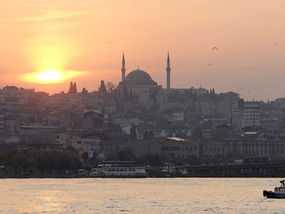by Miranda Sumey
March 30, 2013
The recent historic address from imprisoned Kurdistan Workers’ Party (PKK) leader Adbullah Ocalan sent political speculators scurrying to extol Turkey’s prospects of finally obtaining a “real peace.” While the latest efforts at peace between the Turkish government and Kurdish rebels may in fact be the most serious to date, the situation remains as fragile as ever. Much more than a ceasefire has to occur before a permanent armistice can take hold in the Kurdish region of Turkey. Both parties still face an uphill battle.
Ocalan’s group of rebels, known as the PKK, has been waging war with the Turkish government for nearly 30 years. Originally, Ocalan called for the establishment of an independent Kurdish state, but of late the PKK has tempered its demands to include increased autonomy and political rights for the Kurdish people. A minority ethnic group residing primarily in the region straddling the borders of Turkey, Iran, Iraq, and Syria, the Kurds make up an estimated 15 million of Turkey’s total population of 80 million. They have long suffered discrimination and oppression at the hands of the Turkish government, the conflict with whom has left over 40,000 dead on both sides and trapped large portions of Turkey in residual poverty. Presently, the PKK is considered a terrorist organization by Turkey and its Western allies, including the United States.
In his latest statement from prison, Ocalan asked rebel fighters of the PKK to put an end to the ongoing violence and withdraw from Turkey completely. “Let guns be silenced and politics dominate,” said Ocalan in a statement read in Diyarbakir by a pro-Kurdish politician.[1] “The stage has been reached where our armed forces should withdraw beyond the borders … It’s not the end. It’s the start of a new era.”[2]
Despite the seemingly rosy overtones, however, this is not the first time the Kurdish rebels have declared a cease-fire. In the past, most Kurdish attempts at peace have been ignored by the government, which has vowed to fight the PKK until the bitter end. Turkish forces allegedly ambushed and massacred PKK combatants in 1999 as they retreated under orders from Ocalan, who first called for peace soon after his imprisonment. A similar incident occurred during another unilateral decision to capitulate in 2004. For many Kurds, these actions by the Turkish government speak louder than any appeals for peace from Prime Minister Recep Tayyip Erdogan. Repeat reneging on the part of the Turks has left a bitter taste in the Kurdish mouth. Still, all hope is not lost: despite his 14-year incarceration in a prison island near Istanbul, Ocalan wields a lot of control over the PKK, and his calls for peace are not likely to fall on deaf ears. PKK commanders in Iraq have declared support for his peace initiative, and Kurdish fighters in Turkey will likely obey Ocalan’s plea and withdraw.
For his part as well, Prime Minister Erdogan has cast his political clout behind Ocalan’s efforts at peace. “If guns are put down, military operations will cease,” he said in response to Ocalan.[3] A real peace promises to benefit more than just the repressed Kurdish people. Recent efforts at a lasting peace follow a surge in bloodshed last year that cost nearly a thousand lives on both sides and may have strengthened the resolve of the Turkish government to find a permanent solution to the conflict. Concurrently, a Kurdish group linked to the PKK has gained control in Syria in the midst of a bloody civil war, further worrying the Turkish government. Additionally, it comes as no surprise that Turkey’s conflict with the PKK is hampering its economic and political ambitions in the region, as residual conflict has left large portions of the country mired in poverty.
The primary difference between this latest movement and previous efforts at peace centers on its transparency. Prior negotiations between the Turkish government and the PKK were conducted in secret, often going unnoticed by the public. This time, however, both sides aim to carry out talks in the open. In a gesture of goodwill, the PKK recently released eight Turkish hostages held captive by the guerillas since last year. The first concrete, tangible result of the peace talks has sparked renewed hope.
While speculators across the world may see a light at the end of the tunnel, many in the region share the sentiment that this is only the latest iteration in a string of many unfruitful peace initiatives. In the streets of the Kurdish region, skepticism abounds regarding the government’s commitment to peace. Thirty years of strife and entire generations who know nothing but violence have left the Kurds with minimal trust in the government. Truthfully, the road to peace is fraught with obstacles. Ocalan is relying on his PKK colleagues who he hasn’t seen in over a decade to toe his line. Erdogan, as well, faces political opposition from government hard-liners who resist any increases in Kurdish rights or autonomy. Hawks on both sides are likely to try and sabotage the peace process and resume the carnage. Despite the challenges, however, exasperated Kurds and Turks alike have little to do but cling to prospects of peace.
If the Turkish government can successfully navigate the many roadblocks that it will encounter in the coming months, they might just be able to capitalize on this opportunity for implementing a permanent solution to the Kurdish conflict. A ceasefire is a major step towards a resolution to one of Europe’s longest conflicts, but laying down arms alone will not bring about enduring peace: both sides must follow through, and the slow wheels of democracy and constitutional change must turn. Peace will not happen overnight.
[1] Pelin Turgut, New Day for the Kurds: Will Ocalan’s Declaration Bring Peace With Turkey?, Time World, March 21, 2013, http://world.time.com/2013/03/21/new-day-for-the-kurds-will-ocalans-declaration-bring-peace-with-turkey/#ixzz2OrCp3YKz
[2] id.
[3] id.


Leave a Reply